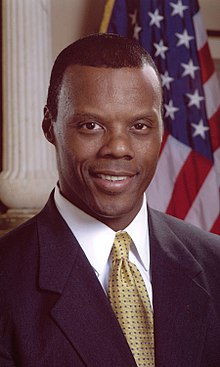The Humiliation of Trent Lott
Jared Taylor, American Renaissance, February 2003
Trent Lott is off the front pages now, and the sorry story of his humiliation is drifting into history. The press has even gone back to reporting on him with straight news stories that do not mention his disgrace. In January, he accepted the chairmanship of the Senate Rules and Administration Committee, and was likely to be named to the Select Committee on Intelligence. Americans love a scandal but have short memories, and if Mr. Lott is reelected to the Senate in 2006 there is no reason to think he doesn’t have plenty of politics left in him. But even if the furor eventually leaves few marks on Trent Lott, it has exposed the truly shabby, cowardly, groveling nature of the American political class, especially of that part of it that claims to be “conservative.”

Mississippi Senator Trent Lott
Forty-five Words
The senator from Mississippi was brought down by only 45 words, spoken last Dec. 5 at a 100th birthday celebration for the retiring senator from South Carolina:
I want to say this about my state: When Strom Thurmond ran for president, we voted for him. We’re proud of it. And if the rest of the country had followed our lead, we wouldn’t have had all these problems over all these years, either.
These words were heard by reporters and even broadcast by C-SPAN, but there was at first no outcry. Democratic hatchetmen Sidney Blumenthal and James Carville tried to drum up a scandal, but at first only a few partisan websites took up the cry. Editors at the big-time media dismissed the comments as birthday banter. Although he made his remarks on a Thursday, there was so little initial opposition that Mr. Lott did not refer to them again until the next Monday, when he explained they were just part of a “lighthearted celebration.” Only after reporters called up “conservatives” who were not at the party, and got them to treat Mr. Lott’s remarks as if they were an endorsement of segregation, did the story begin to grow. As more and more “conservatives” piled on, virtually every commentator lined up to kick Mr. Lott. The senator went into his Bataan Death March of self-abasement, but lost his job as Senate Majority Leader anyway.
What did Mr. Lott mean by his Dec. 5 remarks, and what was the significance of the whooping, whining, and groveling that followed? The first question is more difficult than the second. Somewhere deep within today’s blow-dried Tent Lott there may be a realization that integration has gone badly wrong and that his ancestors had reasons for setting up society as they did. Mr. Lott, was born in 1941 and grew up in firmly segregationist Mississippi, but he is a born politician who has tried to please so many different crowds he may have no convictions left at all. Politics and flirtations with racial consciousness appear to have been part of his makeup ever since he was a teenager.
In high school, Mr. Lott was so busy pumping students for votes for school elections he knew more underclassmen than anyone else in his senior class. At Ole Miss, he was president of the Intra-Fraternity Council, and in the early 1960s helped win the fight to keep his fraternity Sigma Nu segregated. He was at Ole Miss when whites rioted to keep James Meredith from integrating the campus, and though he opposed admitting blacks, he made sure his 120 frat brothers stayed home rather than riot. “Yes,” he told Time magazine in 1997, “you could say that I favored segregation then. But I don’t now.” He was a cheerleader, and gloried in marching the Confederate flag — then the school banner — onto the football field. He majored in public administration, the clear choice for aspiring politicians.
He went on to law school at Ole Miss, and in 1968, with a fresh Juris Doctorate, became administrative assistant to William Colmer, the Democratic congressman from his hometown of Pascagoula. Colmer was a staunch segregationist, who like many Southern congressmen, bitterly fought the “civil rights” and immigration legislation of the 1960s. In 1972, Colmer anointed Mr. Lott his successor, even though Mr. Lott ran as a Republican.

Credit Image: © Erik S. Lesser / ZUMAPRESS.com
Mr. Lott was certainly useful in Congress. His first piece of legislation was an anti-busing bill. In 1981, he filed a friend-of-the-court brief opposing the IRS’s ruling revoking Bob Jones University’s tax exemption, which it had enjoyed since 1927, because it prohibited interracial dating on religious grounds. That same year, he voted against extending the Voting Rights Act (which, despite its name, is a set of voting restrictions that apply only to the South), and in 1983 he was one of 98 House members who voted against making Martin Luther King’s birthday a national holiday.
In 1988, Mr. Lott won a seat in the Senate, where he continued to be useful. In 1997, he led the opposition to William Clinton’s appointment of William Lann Lee as head of the Civil Rights Division of the Department of Justice, arguing that Mr. Lee’s policies discriminated against whites. In 1998, Mr. Lott voted for an amendment (which failed) that would have eliminated the largest federal minority set-aside program. In 2001, he cast the only vote in the Senate against appointing Judge Roger Gregory as the first black to sit on the US Fourth Circuit Court of Appeals (he said it was a matter of principle to oppose recess appointments).
So, does Mr. Lott favor segregation or doesn’t he? Given his upbringing and career, he cannot help but have heard every argument — boneheaded to sophisticated — for racial separation. His critics point out that back in 1980, campaigning with Strom Thurmond, he had already spoken what later proved to be the fatal words: “You know, if we had elected this man 30 years ago, we wouldn’t be in the mess we are today.” Enemies have also pounced on a 1998 speech at the dedication of the Jefferson Davis presidential library in Mississippi, in which he said, “Sometimes I feel closer to Jefferson Davis than any other man in America.”

Strom Thurmond
People whose job it is to detect “racism” take it for granted that Mr. Lott is a segregationist who has been quietly spreading his poison as best he could. However, Mr. Lott has been in politics without a break ever since he got out of school, and has probably always been ready to sacrifice a conviction to win a vote. He was in Congress only five years before he got himself elected into the Republican leadership hierarchy, and later became whip, or Republican second-in-command. In the Senate, he politicked his way into various positions, including majority whip, before he got the top job. He has been running popularity contests all his life, and like any successful politician, knows how to tell people what they want to hear. What he said on Dec. 5 was probably nothing more than the best bit of flattery he could think up at the moment, and almost certainly reflects no serious thought about anything at all.
Mr. Lott’s willingness to trim and backpedal became painfully clear when the uproar began, and it looked like he might lose his position as majority leader. At first he said his support of Strom Thurmond’s 1948 presidential campaign had been all about states’ rights, limited government, and anti-communism. When that didn’t work, he insisted he had not intended to “embrace discarded policies of the past.” “I’ve asked and am asking for forbearance and forgiveness as I continue to learn from my own mistakes,” he told a crowd of reporters in Pascagoula. At one point he went running to Colin Powell and Condoleezza Rice — blacks with whom he has no doubt had cordial relations — hoping they would throw him a bone. They cut him dead.
But it was during his 30-minute appearance on Black Entertainment Television (BET) that he behaved the most odiously. He insulted his ancestors by declaring that the racial regimen in the South had been “wrong and wicked,” and that he himself had been part of an “immoral leadership.” He praised Ole Miss for doing away with the Confederate battle flag he once claimed to revere. He said that if he had it to do over again he would vote for the King national holiday. But his most transparent lie was that he now favors affirmative action. “Across the board?” asked his astonished interviewer. “Absolutely,” replied Mr. Lott. He then bragged that as majority leader he had the power to push through programs that would help blacks and other minorities. Gushing like a new convert, he said he was talking to black legislators about starting a “task force of reconciliation” that would busy itself with racial healing.
This cannot have fooled anyone. It is just not possible to believe that Trent Lott, aside from whether he wants segregation, should suddenly become an apostle of the racial preferences he has fought all his life, and seriously wants to gin up a “task force of reconciliation.” Are we supposed to imagine him holding hands in a circle with the Black Congressional Caucus, singing “Kum ba yah” and “We Shall Overcome”?

Why was Mr. Lott prepared to twist and wriggle and lie and eat dirt if he thought it would save his job? Probably because if you strip this man of political office there is nothing left. Trent Lott Middle School in his hometown got its name because Mr. Lott is a big bug in Washington, not because he is a man of courage or conviction. The same is true for Trent Lott International Airport just outside of town, the Trent Lott Leadership Institute at Ole Miss, and the Trent Lott scholarship series at University of Southern Mississippi. Even Jackson State University — the black school — has a Trent Lott GeoSpatial and Visualization Research Center, of all things. Men with dignity do not allow their names to be plastered on buildings during their lifetimes, but pork, power, and patronage are Mr. Lott’s meat and drink, and there is apparently no dishonor he would not swallow if he could keep his job. And this is a man who claims to feel closer to Jefferson Davis than to any American dead or alive.
Trent Lott has shown us how completely lust for power and pride of position can corrupt a man. Power is such intoxication to him that he will say and do anything to keep high office in a government he always complained was too big and powerful anyway. This kind of transparent power-madness alone should tell us how diseased our ruling class has become. The rest of the Republicans and “conservatives” are no better. They rose up in righteous anger to tell us Mr. Lott is such a moral leper he cannot possibly lead the Republicans. But then shouldn’t such a wretch resign from the Senate? Doesn’t Mississippi, scene of so many painful battles in the long war for racial brotherhood, deserve a senator who is not a white supremacist? Why, no! If Mr. Lott left the Senate, Mississippi’s Democratic governor would appoint a Democrat to take his place, and the Republicans would lose their majority! An unmasked bigot must therefore continue to represent the state with the highest percentage of blacks, so Republicans can continue to enjoy their committee chairmanships and perks of power. They are, in other words, just as craven, unprincipled, and power-hungry as Mr. Lott.
And what does the frenzy for Trent Lott’s scalp tell us about the country as a whole? We have perhaps the clearest example yet of thought crime and punishment. No one has suggested Mr. Lott ever harmed a black person or even wanted to harm one. His voting record is little different from that of Sen. Donald Nickels of Oklahoma, who was first mooted as his replacement, or of Sen. William Frist, who did replace him. In other words, Mr. Lott has done nothing wrong. What he did was say a few things that could be interpreted as supporting segregation. He apologized publicly no fewer than five times. He begged for forgiveness in the most piteous way. However there is no forgiveness for people who might be “racists,” and he became the first Senate majority leader in history to be forced out under a cloud. As black Harvard law professor Randall Kennedy pointed out happily, “It lays down a marker for the parameters of acceptable sentiment and opinion.” “It’s important that certain things are made verboten in electoral politics,” he added. That neatly sums it up: Blacks decide what is verboten and white “conservatives” enforce their orders.
The whole affair is unspeakably sordid. Apart from the usual buffoons, it was blacks who defended Mr. Lott most decently. The only black Republican in Congress, outgoing Rep. Julius Ceasar Watts of Oklahoma, said the remarks were nothing more than “complimentary humor that often accompanies personal tributes.”

Congressman Julius Ceasar Watts
Walter Scott, a black businessman in Jackson, Mississippi agreed:
The fact of the matter is he was conducting a birthday party for a man that had reached the age of 100 and was giving him his due. I’ve known Trent Lott for 25 years. He’s not a racist.
John Lewis, the black congressman from Georgia who is a veteran “civil rights” activist, said after the BET spectacle:
I’d like to come down on his side, giving him a chance. I’m not one of those calling for him to step down . . . We all make mistakes, we all make blunders. It’s very much in keeping with the philosophy and discipline of nonviolence to forgive and move on.
Were any whites as gracious? No, they were quick to demonstrate their moral purity by ganging up on a “racist.” They rushed to prove that in politics and public commentary there are no legitimate white interests, and no sympathy for anyone who even suggests there are. White conservatives swore Mr. Lott was a loathsome exception; white liberals swore he was the loathsome rule. Here is former President William Clinton, trying to tar all Republicans: “I think that the way the Republicans have treated Senator Lott is pretty hypocritical, since right now their policy is, in my view, inimical to everything this country stands for. They’ve tried to suppress black voting, they’ve ran [sic] on the Confederate flag in Georgia and South Carolina. And from top to bottom, the Republicans supported it. So I don’t see what they’re jumping on Trent Lott about.”
Ward Connerly, on the other hand, offered the most interesting defense of all for Mr. Lott. A black man who heads the American Civil Rights Coalition and who has campaigned successfully against racial preferences, he explained to CNN television commentator Wolf Blitzer on December 13 that “supporting segregation need not be racist. One can believe in segregation and believe in equality of the races.” Mr. Blitzer passed over this in embarrassed silence, once again proving that blacks can say things whites cannot.
But now that the hubbub is over, where is the “task force on reconciliation” Mr. Lott promised us on national television? He is still a senator, and could throw one together. Or was the deal that we would get a task force only if he got to keep his job? That makes no sense. If his 45 words were so evil and hurtful he had to resign, doesn’t the country needs more “reconciliation” than if they weren’t so bad and he could stay on? Can’t we make the same argument for the affirmative-action programs Mr. Lott was going to push? Now that he’s lost his job are they suddenly no longer needed? It is hard to find much in Mr. Lott’s behavior that does not stink of dishonesty.
One can fantasize about a completely different but impossible Trent Lott, a Trent Lott with backbone. One can imagine him actually explaining just what problems a Strom Thurmond victory in 1948 might have spared us. A “Dixiecrat” victory would have meant 50 percent of Americans voting for limited government and racial separation, not just 2.4 percent. A difference of this scale would have meant a completely different United States, one that would certainly not have taken the suicidal turns of the 1950s and 1960s. It is hard to imagine much of anything about the country that would not be unrecognizably different if Mr. Thurmond had become president. Mr. Lott made headlines, and was on the cover of Newsweek for mouthing the most degrading racial orthodoxy — and for losing the fight and his dignity anyway. Imagine the sensation if he had stood up for his people rather than crawl for his job! Impossible. There are limits to even the most fertile imagination.















